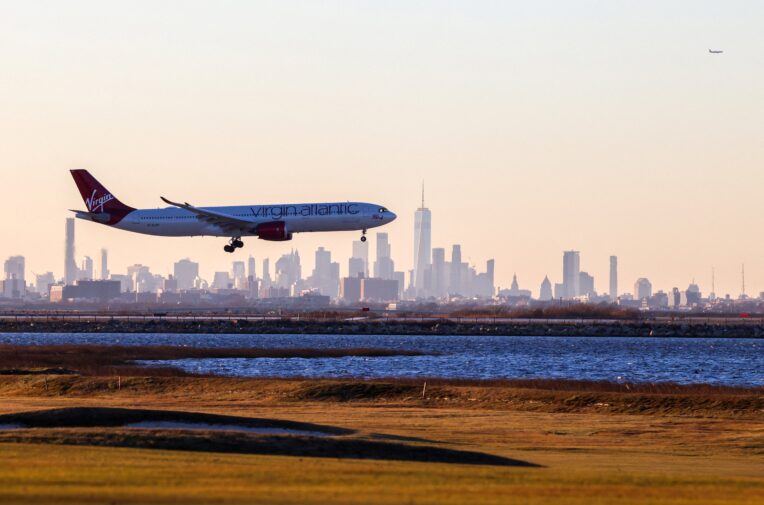
A Virgin Atlantic plane lands in New York; the company is one of five that have apparently continued to promote environmental claims that were ruled "misleading" by the Advertising Standards Authority. Photo: Charly Triballeau / AFP via Getty Images
Revealed: Companies repeat misleading green claims despite UK ad bans
Anti-greenwashing campaigners warn the “system seems broken” after Unearthed finds some claims repeated despite regulator clampdown
Revealed: Companies repeat misleading green claims despite UK ad bans
Anti-greenwashing campaigners warn the “system seems broken” after Unearthed finds some claims repeated despite regulator clampdown
A Virgin Atlantic plane lands in New York; the company is one of five that have apparently continued to promote environmental claims that were ruled "misleading" by the Advertising Standards Authority. Photo: Charly Triballeau / AFP via Getty Images
Major brands, including car manufacturers, an airline, and a bottled water company have apparently continued to promote environmental claims after they were ruled “misleading” in a crackdown on greenwashing by the UK’s advertising watchdog, an Unearthed investigation has found.
Among them is Virgin Atlantic, which has kept posts pinned to the top of its Instagram, TikTok, and X accounts boasting it completed the first transatlantic flight using “100% sustainable aviation fuel.” The Advertising Standards Authority (ASA) ruled against Virgin nine months ago for using this language in an advert, saying it was likely to lead a “significant proportion” of people to “overestimate” the environmental benefits of the fuel.
Meanwhile, the car company Renault published videos on Facebook and YouTube last year claiming its hybrid cars offered “up to 80% electric driving” in the city, despite a 2023 ASA investigation which found that this wording fell foul of rules against misleading environmental claims.
And the front page of bottled water brand Aqua Pura’s website continued to boast about its “NEW Environmentally Friendly Caps”, three years after the ASA told the company to stop claiming that plastic bottle lids were “eco-friendly”.
An Unearthed analysis of online marketing activity by 44 companies ruled to have made misleading green claims in recent years found that at least five had continued to promote similar or identical claims after the ASA ruling.
Andrew Simms, director of the campaign group Badvertising, which has called for tougher regulation of greenwashing and a ban on advertising “high carbon” products, said that for some industries the rules against making false green claims seemed to be “hidden in clouds of their own planet-heating pollution”.
He added: “If, on the rare occasions that complaints to the regulator are investigated and upheld they simply get ignored, then the system seems broken, leaving the public in the grip of misinformation.”
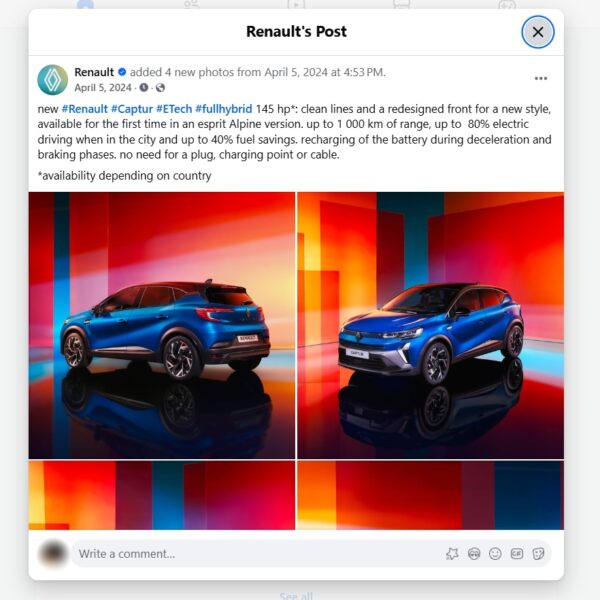
A spokesperson for the ASA, which regulates UK advertising across all media, said that the regulator’s work on climate change and the environment “continues to be a priority area and we continue to proactively monitor green claims using our AI-based Active Ad Monitoring system, finding ads that potentially break our rules and getting those that do quickly amended or removed”.
“Monthly sweeps show high levels of compliance and we continue to act where we spot non-compliant ads,” he told Unearthed. “We are seeing businesses adapting and evolving to make better evidenced, more precise green claims.”
Unearthed provided the ASA with details of recent marketing activity by 16 companies that the regulator ruled had made misleading environmental claims. Of these companies, Unearthed found that five had apparently continued to promote claims that were actually or in effect identical after the ruling. These included instances where claims had been newly posted after the ruling, or where they had been maintained in prominent positions like the frontpage of a website, or pinned to the top of a social media account.
In addition, Unearthed provided details about a further 11 companies, which are not named in this article. These involved claims which merited review by the regulator but were less clear-cut – for example, instances where a claim was repeated shortly before it was ruled misleading.
The ASA spokesperson said the regulator would carefully assess the ad claims Unearthed had brought to its attention and it would “consider each case on its merits”. He added that the ASA could not make definitive judgements within the “short timeframe provided”, but that its initial assessment suggested there were “a number of examples that do not present obvious or clear-cut issues under our rules”.
However, at least three of the companies made changes to their websites this week after being approached by Unearthed for comment. These included Sources Alma, the French parent company of Aqua Pura.
A spokesperson for Sources Alma said the company had “never intended to mislead consumers with inappropriate or erroneous environmental claims”.
She told Unearthed: “We are aware of the [ASA’s] decision on 19 January 2022 concerning our TV ad featuring the Aqua Pura brand.
“At the same time, our marketing department, whose teams are split between the UK and France, has undergone a major restructuring. As a result, it has not been able to apply the ASA’s recommendations effectively across all communication channels between 2022 and 2023.”
Yesterday afternoon (Tuesday) Aqua Pura’s website was offline while “undergoing maintenance”.
The company’s spokesperson added: “In any case, we are now in line with ASA recommendations.”
A Renault UK spokesperson said the car manufacturer would “investigate the issues raised” by Unearthed’s findings.
However, a spokesperson for Virgin Atlantic told Unearthed that sustainable aviation fuel would be key to achieving net zero, and that the company’s transatlantic flight using the fuel was a “milestone for the industry”.
She added: “Social posts were shared to mark the achievement, demonstrate the breadth of the project and the challenges that remain for the industry to achieve net zero.”
The Virgin posts remained in place as of this morning.
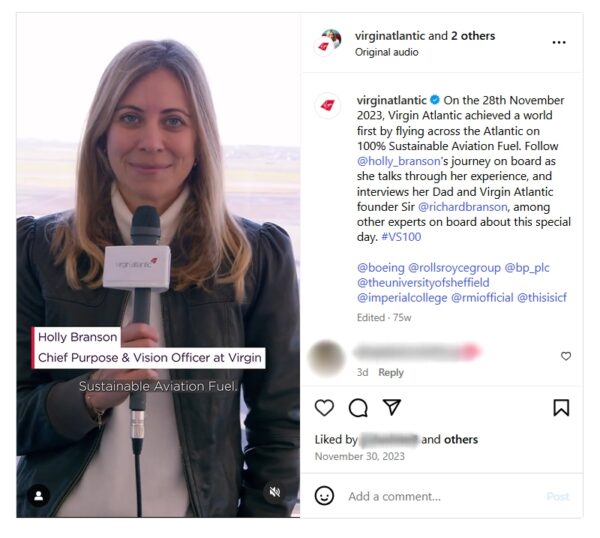
The ASA launched its multi-year crackdown on greenwashing in advertising in September 2021, in what it said was an effort to support the UK’s push for net zero. By the end of last year this had resulted in rulings against 44 companies for breaching rules against misleading environmental claims.
Unearthed carried out a review of online activity by these companies to see how they had responded to the ruling.
The rules on environmental claims require advertisers, among other things, to be clear about the basis of the claim being promoted. If an advertiser makes an “absolute” claim – like describing a product as “eco-friendly” or “100% recycled” – this has to be supported by a high level of evidence.
“Eco-friendly” claims
In a November 2023 radio advert, Virgin Atlantic claimed it was about to become the first commercial airline to fly across the Atlantic using “100% sustainable aviation fuel.”
Sustainable aviation fuels (SAFs) are derived from waste cooking oils and fats, green waste and non-food crops. They generally have a lower “lifecycle” carbon footprint than petroleum-based jet fuels, but they produce just as much CO2 when burned.
Virgin’s “Flight100” was hailed by the UK government at the time as a “major milestone towards making air travel more environmentally friendly” and heavily promoted by the airline.
However, the ASA received complaints about Virgin’s radio advert, and in August last year it ruled that the unqualified claim “100% sustainable aviation fuel” was misleading. The regulator said a significant proportion of listeners would think this meant that the fuel itself was 100% sustainable. It concluded that most consumers were “unlikely to be aware of the extent to which fuels described as sustainable aviation fuel still had negative environmental impacts”. Virgin had told the ASA that the flight was calculated to have delivered 64% savings in “lifecycle” greenhouse gas emissions, but this, the regulator said, showed that SAF “still produced significant emissions over its lifecycle”. It told Virgin that in future adverts referring to SAFs needed to explain the environmental impact of the fuel.
Despite this, Virgin kept video posts which use the “100% sustainable aviation fuel” claim “pinned” to the top of its corporate Instagram, TikTok and X feeds – ensuring they are among the most visible posts to visitors on these pages. In addition, Virgin marked the first anniversary of the flight with a new Instagram post repeating the claim, published four months after the ASA ruling. None of these posts provide any qualifying information about SAF’s environmental impact.
A Virgin Atlantic spokesperson told Unearthed that it was “committed to achieving net zero by 2050” and SAF would be key to this as “one of the most immediate levers to decarbonising long haul aviation”.
She added: “Flight100 was a milestone for industry globally as it proved that SAF is a safe, 100% drop-in replacement for fossil fuel and demonstrated the radical collaboration required to drive increased production, supply and uptake.”
But Alethea Warrington, head of aviation, heat and energy at climate charity Possible, told Unearthed: “The aviation industry wants us to believe that speculative and unscalable technologies can keep the sector growing while bringing emissions under control.”
Unearthed also found several instances of carmakers apparently repeating claims about the environmental impact of their vehicles similar to those that the ASA had already ruled to be misleading.
In November 2023, the ASA issued a ruling against Renault for an online advert that said one of its hybrid vehicles offered “up to 80% electric driving in the city”.
The regulator concluded there were “numerous possible interpretations” of the claim, from the share of journeys completed in electric mode to the time spent without petrol. It ruled that Renault’s advert “omitted material information and was likely to mislead.”
Renault told the ASA it removed the original ad. However, in 2024 it used the same claim in a Youtube video for the Renault Symbioz, and separately in two Facebook posts for other vehicles. In all three examples, no explanation of how this claim should be interpreted was included.
Misleading advertising of fossil fueled cars to make them appear ‘green’ risks delaying crucial emissions reductions
– James Ward, AdFree Cities
A Renault spokesperson told Unearthed: “Renault UK takes its responsibilities seriously and will investigate the issues raised.”
In early 2024, the car brand MG was reprimanded by the ASA for using the unqualified claim “zero emissions” in an online advert for a range of electric and hybrid models, including the MG5 EV. The ASA ruled that the company needed to be clear that the phrase “zero emissions” only applies to an electric vehicle while it is “being driven,” since EV manufacturing and charging can still produce carbon emissions. For plug-in hybrids, the ASA said MG must be clear that the claim applies only when driving on battery power.
Still, MG’s August 2024 brochure for an MG5 electric vehicle repeatedly boasted that it had “zero emissions” without providing any further qualifying text. Separately, a description on MG UK’s website for a used MG4 included the unqualified text: “Eco-Friendly & Cost-Efficient: Say goodbye to fuel costs and embrace zero emissions with an electric vehicle that’s both good for the planet and your wallet.”
After Unearthed approached MG for comment this week, this text was removed from the used car advert on its website.
A spokesperson for the brand said: “MG Motor UK fully accepted and then immediately responded to the ASA at the time, this related to a hybrid vehicle also being featured alongside an EV model and this was a point of clarification from the ASA which we accepted. We will always fully and actively cooperate with the ASA regarding any guidelines and all our creative teams are actively briefed to do so.”
James Ward, anti-greenwash campaigner at the campaign group Adfree Cities, said car advertising was “rife with greenwash claims,” and that “misleading advertising of fossil fueled cars to make them appear ‘green’ risks delaying crucial emissions reductions needed in the transport sector, which remains the UK’s highest emitting sector.”
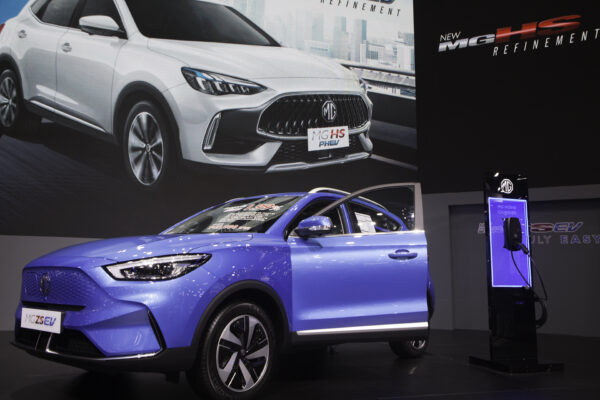
Unearthed also found examples of plastic product manufacturers apparently continuing to promote claims after they had been ruled misleading. Easigrass, a UK artificial grass manufacturer, had continued to claim on its website that one of its plastic grass products was“eco-friendly and 100% recyclable” more than a year after the ASA told the company to stop making these claims about a similar product. The watchdog had found no evidence that plastic grass was “eco-friendly”, and concluded the term “fully recyclable” was misleading because there was only one facility in the entire UK that could recycle plastic grass.
After Unearthed approached Easigrass for comment the company removed the claims from its website, and thanked Unearthed for bringing them to its attention.
A spokesperson said: “We acknowledge the ASA’s ruling issued in March 2024 and can confirm that the marketing language referenced in your message was scheduled for removal following that decision.”
The spokesperson added that the claims identified by Unearthed had been “inadvertently missed” by Easigrass’ website team.
Similarly, the bottled water brand Aqua Pura was censured in January 2022 for a TV ad describing its 500ml bottle as a “100% recycled & recyclable bottle with eco-friendly cap.” The ASA ruled the claim “100% recycled bottle” misleading, since the cap and label were not recycled. The ruling also took the brand to task for claiming its bottles had an “eco-friendly cap”. Aqua Pura was told not to “overstate the environmental benefit” of its products, and not to “claim that products made of plastic were ‘eco-friendly’ or ‘nature friendly’”.
Despite this, until this week the front page of the brand’s website continued to boast about “NEW Environmentally Friendly Caps.” Unearthed also found that in two 2022 LinkedIn adverts posted after the ruling, Aqua Pura continued to describe its bottles as “100% recycled plastic” without clarifying this excluded caps and labels, and called their plastic caps “eco-friendly.” And a Facebook post for that year’s National Recycling Week also claimed “our bottles” are made from “100% recycled plastic,” without qualification.
A spokesperson for Aqua Pura’s French parent company, Sources Alma, told Unearthed that preserving the environment was an “absolute priority”, but that a 2022 restructuring of the company’s marketing department meant it had “not been able to apply the ASA’s recommendations effectively across all communication channels between 2022 and 2023”.
“Nevertheless, we take the ASA’s recommendations and the various points raised [by Unearthed] very seriously,” she continued.
“We will verify the current and future application of all recommendations relating to environmental claims, particularly on our website.”
She said the company’s product labels made clear that the claim “100% recycled” excluded caps and labels, and added: “We will also make this clear on our website.”
She added that the brand’s bottle caps remained attached to the bottles, preventing “the cap from being lost in nature, thereby reducing the amount of plastic waste that could end up in the environment”. “We are proud of this technology and wanted to highlight the benefits of this specific cap compared to a standard cap,” she said.
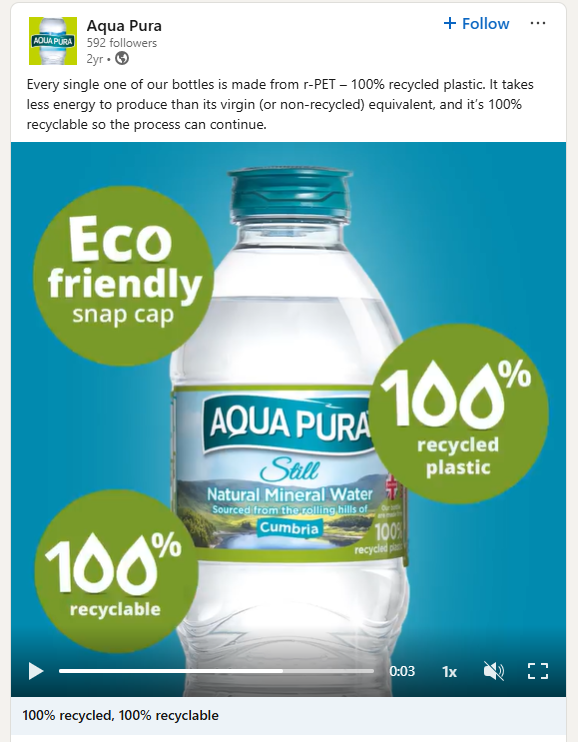
Tougher sanctions?
The ASA is responsible for investigating complaints to ensure ads comply with its advertising codes, and banning those it deems misleading, harmful, or irresponsible.
It is clear that consumers care about sustainability, or else companies would not even mention the environment
– Genevieve Guenther, End Climate Silence
The ASA claims most advertisers comply with its rulings to avoid significant reputational damage, however it does not have the power to impose fines. For “non-compliant” offenders, its sanctions are limited to naming and shaming companies on its website, requesting ads be removed from search engines and social media platforms, and issuing its own paid ads calling out violations. Once censured, companies are instructed not to run substantively similar ads in the future.
Campaigners like Badvertising have argued that the ASA is “not fit for purpose” to regulate advertising claims by polluting companies, and have called for reforms including “a mandate for legally binding rulings and fines” and enforcement powers to “suspend an advert pending investigation”.
Victoria Harvey, a PhD student at University of East Anglia specialising in sustainability in UK advertising, told Unearthed: “My research shows that the advertising trade bodies in general do not go far enough to protect against greenwashing.”
She added: “We urgently need updated and fit for purpose regulation that works harder to protect consumers and the environment.”
However, the ASA spokesperson said it was seeing businesses “adapting and evolving” in response to its work on climate and environment, and making “better evidenced, more precise green claims”. He added: “As an example, following our airline rulings on ‘sustainable’ and ‘eco-friendly’ claims, of the circa 140,000 ads monitored, five were found to be non-compliant.”
“It is clear that consumers care about sustainability, or else companies would not even mention the environment,” said Genevieve Guenther, founding director of media watchdog organisation End Climate Silence and author of The Language of Climate Politics.
“So even if the ASA cannot fine the companies that continue to mislead about the climate impacts of their products and services, consumers can boycott those companies to register their displeasure and even force them to change their practices.”
Political pressure
In some parts of Europe, governments have begun to impose tougher restrictions on advertising for high-carbon products. In 2022, France became the first European country to ban fossil fuel advertising. Cities including Edinburgh, in Scotland, and the Hague, in the Netherlands, have introduced bans on a range of high-carbon advertising, including commercial flights, SUVs and cruise ships.
In London seven months ago, Green Party Assembly member Caroline Russell urged Mayor Sadiq Khan to restrict fossil fuel ads on the capital’s public transport network, which has hosted more than 240 oil and gas campaigns since 2018.
“I’ve repeatedly challenged the Mayor on [Transport for London’s] advertising policies, and this new research leaves no room for doubt,” she told Unearthed. She added that companies that misled the public about their environmental records have “no business having access to prime advertising space in our city.“

